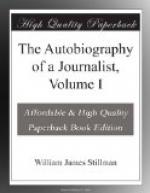One day there was a conversazione at which Alcott, the “Oracle of Concord,” was to be the chief personage, and, as he had the habit of monopolizing the talk when he took any part, it was suggested that I should try my strength against his. Although Emerson had a high opinion of Alcott, he seemed to me a shallow and illogical thinker, and I have always felt that the good opinion of Emerson was due rather to the fact that Alcott presented him with his own ideas served up in forms in which he no longer recognized them, and so appeared to Emerson as original. Such originality as he had was rather in oracular and often incomprehensible verbiage than in profundity of thought, but, as no one attempted to bring him to book, bewildered as his audience generally was by the novelty of the propositions he made or by their absurdity, he used to go on until suggestion, or breath, failed him. I have forgotten, long ago, the subject of debate, but Alcott started out with one of his characteristic mysticisms, and, after allowing him to commit himself fully, I interrupted him with a question. He was a little irritated at being stopped in the flow of his discourse, and showed it, but this did not disturb me, and I insisted on an explanation of what he had said. He was not in the habit of explaining himself, and replied very much at random, but the training of old Dr. Nott stood me in good stead, and I followed him up with question and objection until he assumed a position diametrically opposed to that from which he started, when I called his attention to the fact that what he then said contradicted what he had at first said. He got angry, and replied that “a man was not bound to be consistent with himself, and that it did not matter.” But he lost his thread as well as his temper, and the conversazione came to a premature end, to the great satisfaction of the conspirators, most of whom had at one time or another been silenced in their attempts to bring him to logical conclusions, by his autocratic way of carrying on the debate without regard to objections, which they had not had the courage to urge.




